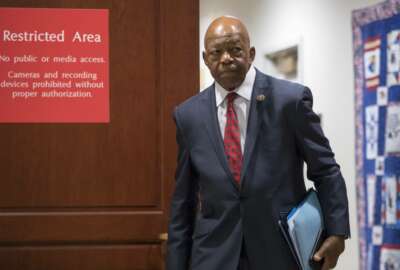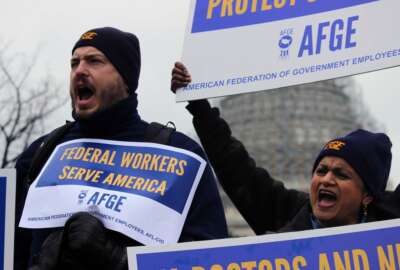
SSA tells union to leave by month’s end, details new official time cuts
The Social Security Administration has given the American Federation of Government Employees until July 31 to vacate agency property.
Best listening experience is on Chrome, Firefox or Safari. Subscribe to Federal Drive’s daily audio interviews on Apple Podcasts or PodcastOne.
The Social Security Administration is the latest agency to inform federal unions of its plans for enforcing the president’s recent executive orders on collective bargaining and official time.
SSA has given the American Federation of Government Employees until July 31 to vacate agency property and return all government-issued computers, phones and other equipment, according to an email from AFGE’s National Council of Social Security Administration Field Operations Locals (Council 220) to SSA bargaining unit employees.
The National Treasury Employees Union, which represents roughly 1,700 employees at SSA’s Office of Hearing Operations, received a similar notice to vacate agency office space.
The agency began implementing other changes, which it shared with AFGE two weeks ago, on Monday.
As the executive orders describe, SSA employees must spend no more than 25 percent of their working hours on official time. Performance improvement periods (PIPs) have been shortened to 30 days. SSA employees can no longer file grievances on their performance appraisals, awards and terminations, according to AFGE’s email, and workers can no longer use official time to prepare grievances for their colleagues.
Official time drops from 225,000 to 30,000 hours
The agency will now allow employees to use up to 30,000 hours of official time per fiscal year. SSA previously allowed up 225,000 hours of official time, according to the agency’s newly proposed articles, which Federal News Radio obtained.
SSA’s 49,783 collective bargaining unit employees used a total of 255,481 hours on official time in fiscal 2016, the most recent year that governmentwide data is available, according to OPM.
A spokeswoman for SSA said the agency is complying with recent guidance from the Office of Personnel Management, which told agencies with expired contracts to begin implementing the terms of the president’s executive orders.
“As required by Federal Service Labor Management Relations Statute and our collective bargaining agreements, Social Security provided each union with appropriate notice and the opportunity to bargain the impact and implementation of the executive orders,” the agency said in a statement to Federal News Radio. “In adhering to the directives in the EOs, Social Security is working closely with the unions to ensure an orderly implementation supporting the vital missions we perform for the American public.”
But from AFGE’s perspective, the agency is unilaterally imposing new terms for a collective bargaining agreement that both parties were originally set to discuss and negotiate.
According to AFGE’s timeline of events, SSA informed the union of its intention to end its 2012 contract and start negotiations for a new agreement. The two parties in March signed an agreement establishing ground rules for negotiations. They agreed to exchange proposals for a new contract on Aug. 9, 2018, said Witold Skwierczynski, president of AFGE’s National Council of Social Security Administration Field Operations Locals (Council 220).
AFGE Council 220 represents about 29,000 SSA employees in field offices and service centers.
Earlier in June, SSA informed the union of its intention to reopen 21 of AFGE’s 41 articles in the 2012 contract in attempt to comply with the provisional changes in the president’s executive orders.
Both the union and the agency met between June 27-29 to review and negotiate over SSA’s new articles, Skwierczynski said.
In negotiating with AFGE 220 over the agency’s new articles, SSA did agree to extend the deadline that the union must vacate government property, Skwierczynski said. OPM guidance directed agencies to tell union representatives to leave by July 9.
SSA telework program appears unchanged
SSA’s telework program appears to remain intact. The agency’s new article on the subject mentions that the program can serve as a recruitment and retention tool and can “reduce commuting problems and contribute to a cleaner environment, improve productivity and morale,” the document said.
SSA must notify the union if it chooses to make any significant change to its telework program, the article said.
In addition, SSA’s updated articles set new guidelines for ground rules and bargaining negotiations. Timelines for upcoming bargaining sessions have been shortened, and the agency will no longer cover the costs of travel to these meetings at SSA headquarters in Baltimore, Maryland.
“It puts us in a very precarious situation, because if we don’t represent people … either because of the time or money, they could sue us,” Skwierczynski said. “They could sue us for failure to represent.”
Skwierczynski retired from SSA three weeks ago so he could continue to represent bargaining unit employees on a full-time basis. The decision was a difficult one, because he wasn’t planning to immediately leave, but he is of retirement age.
Skwierczynski spent the past several years working on 100 percent official time at SSA.
“I would have preferred not to [retire], but if today I had to go back to my desk, I haven’t done my job in years,” he said. “I don’t have any clue about how to do my claims work job at this moment, because my job has been representing Social Security employees. I’d have to be retrained.”
Other SSA union representatives are also considering retirement, Skwierczynski said. National AFGE staff are working with local SSA representatives to set up alternative space to meet with employees. Skwierczynski said union representatives will use their lunch breaks to meet with bargaining unit workers.
Union hopes changes are temporary
Although his retirement is permanent, Skwierczynski and AFGE locals are hopeful these plans are temporary.
A federal judge in late July is expected to hear a motion for summary judgment in the consolidated case from at least 15 unions challenging the president’s EOs.
In the meantime, four members, including House Oversight and Government Reform Committee Ranking Member Elijah Cummings (D-Md.), Rep. Peter King (R-N.Y.) and former lawmakers and Civil Service Reform Act contributors Jim Leach (R-Iowa) and William Clay Sr. (D-Mo.) filed a “friend-of-the-court” brief in opposition to the orders.
The president’s executive orders have also earned criticism from lawmakers on both sides of the aisle. A new group of 132 lawmakers have called on President Donald Trump to rescind the EOs. In a July 9 letter, they expressed their concerns that the orders do not comply with existing law and argued the directives would make it more difficult for agencies to recruit and retain a talented workforce.
Rep. Jan Schakowsky (D-Ill.) led the signing of the latest letter.
In addition, 21 House Republicans, along with practically all Senate Democrats, have also written the White House to express their concerns and request that the president rescind the orders.
Copyright © 2025 Federal News Network. All rights reserved. This website is not intended for users located within the European Economic Area.
Nicole Ogrysko is a reporter for Federal News Network focusing on the federal workforce and federal pay and benefits.
Follow @nogryskoWFED
Related Stories

Many agencies already meeting official time limits in Trump’s new EO





